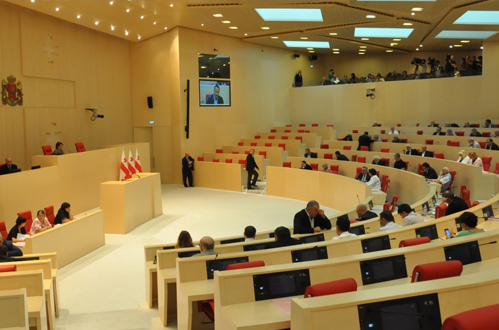
Parliament Overrides Presidential Veto on Banking Supervision Bill

Parliament chamber in Kutaisi, September 2, 2015.
The Parliament overturned on September 3 presidential veto on a package of bills that removes banking supervisory functions from the Georgian National Bank (NBG).
The veto was overridden by the Georgian Dream (GD) parliamentary majority group with 81 votes, 5 more than required minimum of 76.
Opposition lawmakers from UNM and Free Democrats parties voted against overturning the veto.
The vote on September 3 was preceded by lengthy debates a day earlier at parliament’s first sitting after the summer recess during which one senior GD MP called President Margvelashvili “the Sorosian NGO-shnik” who “is getting on our nerves with vetoes.”
MPs were not able to hold voting on September 2 as UNM lawmakers resorted to procedural levers to drag the hearing out and to delay the vote for the next day.
The controversial bill, which has faced criticism from international financial institutions, business associations, opposition parties, a group of civil society organizations and from the central bank itself, was vetoed by President Giorgi Margvelashvili in late July, who said that he was critical towards both “the hasty process” through which the bill was adopted and “its content.”
- Bill on Banking Supervision Gets Final Approval in Parliament
- PM Slams Critics of Bill on Banking Supervision
- IMF, WB, EBRD, ADB Warn Georgia Against Removing Banking Supervision from NBG
Blasting co-sponsors’ claims about the bill being drafted based on the “international best practice”, president’s economic adviser Giorgi Abashishvili discussed in details in his lengthy presentation of presidential objections international trend of placing banking supervision inside the central bank following the 2008-2009 global financial crisis.
Many of his arguments laid out in his speech at the parliamentary session on September 2 were echoing position of international financial institutions, presented in a joint letter by the International Monetary Fund (IMF); European Bank for Reconstruction and Development (EBRD); Asian Development Bank (ADB), and the World Bank in late June in which they were saying, that in Georgia’s case, moving banking supervision out of the central bank “does not seem prudent.”
GD lawmakers say that the proposed system will help to increase the “transparency” of the banking sector and its supervision, as well as to increase “trust” towards the system.
“The only argument that we heard… today is that system will become ‘transparent’ – although it is unclear why you deem it to be non-transparent now,” UNM MP Khatuna Gogorishvili said, adding that the only reason behind this bill in fact is ex-PM Bidzina Ivanishvili’s desire to take control over the system.
The bill has been publicly backed by Ivanishvili, who owns Tbilisi-based Cartu Bank, and who said in early June that the proposal would “give more independence” to the banking sector.
One of the co-sponsors of the bill, GD MP Tamaz Mechiauri, who chairs parliamentary committee for budget and finances, said during debates on September 2 that this proposal will make the system more transparent and “trusted” then it is now because currently the central bank and supervision of the banking system is in the hands of those persons, who were appointed when UNM was in government.
MP Mechiauri said that while opponents are criticizing Ivanishvili for, as they put it, trying to take control over the central bank, he would criticize Ivanishvili for not replacing current central bank chief Giorgi Kadagidze immediately after the GD came into power.
MP Mechiauri also said that it was Ivanishvili’s mistake to pick Margvelashvili as GD’s presidential candidate.
“Another issue over which I would criticize Bidzina Ivanishvili is for making the Sorosian NGO-shnik [a term with Russian suffix used, usually with negative connotation, in reference to an employee of a non-governmental organization] drop his knitting needles and instead giving him veto powers through which he is now getting on our and people’s nerves,” MP Mechiauri said, referring to President Giorgi Margvelashvili’s knitting hobby.
The bill envisages setting up of the Financial Supervisory Agency, which would be in charge of monitoring and oversight of banking sector and other financial institutions; these functions are currently carried out by departments, which are part of NBG.
According to the bill, the planned Financial Supervisory Agency would be governed by a seven-member board. The president of the NBG and one more member of the central bank’s board will take two seats and the five other seats will be occupied by candidates nominated by the government and confirmed by parliament. The head of the agency will be nominated by board members and confirmed by parliament.
One of the main criticisms of the bill is that according to opponents, the proposal is politically motivated, not economically. The bill was initiated in late May amid attacks from GD senior politicians against NBG President Giorgi Kadagidze. The central bank chief, whose seven-year term in office will expire in February 2016, has been a frequent target of attacks from GD politicians after the depreciation of national currency, lari, due to the strengthening of the U.S. dollar and the decline of external earnings in the form of reduced exports and remittances.
The bill will now again be sent to the President for signing, but if he refuses again to sign it within seven days, the bill will have to be signed into law by parliament speaker Davit Usupashvili.
This post is also available in: ქართული Русский